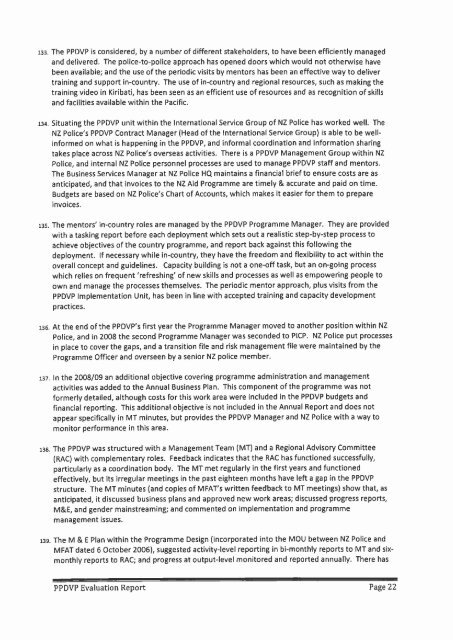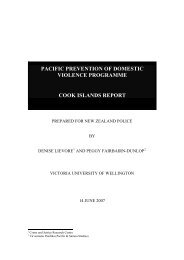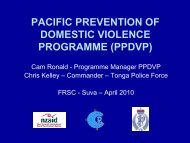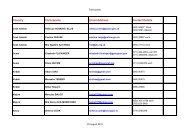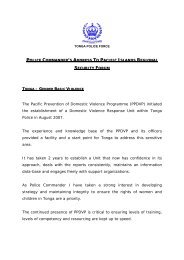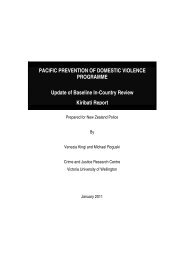PPDVP Evaluation Report - Pacific Prevention of Domestic Violence ...
PPDVP Evaluation Report - Pacific Prevention of Domestic Violence ...
PPDVP Evaluation Report - Pacific Prevention of Domestic Violence ...
Create successful ePaper yourself
Turn your PDF publications into a flip-book with our unique Google optimized e-Paper software.
133. The <strong>PPDVP</strong> is considered, by a number <strong>of</strong> different stakeholders, to have been efficiently managedand delivered. The police-to-police approach has opened doors which would not otherwise havebeen available; and the use <strong>of</strong> the periodic visits by mentors has been an effective way to delivertraining and support in-country. The use <strong>of</strong> in-country and regional resources, such as making thetraining video in Kiribati, has been seen as an efficient use <strong>of</strong> resources and as recognition <strong>of</strong> skillsand facilities available within the <strong>Pacific</strong>.134. Situating the <strong>PPDVP</strong> unit within the International Service Group <strong>of</strong> NZ Police has worked well. TheNZ Police's <strong>PPDVP</strong> Contract Manager (Head <strong>of</strong> the International Service Group) is able to be wellinformedon what is happening in the <strong>PPDVP</strong>, and informal coordination and information sharingtakes place across NZ Police's overseas activities. There is a <strong>PPDVP</strong> Management Group within NZPolice, and internal NZ Police personnel processes are used to manage <strong>PPDVP</strong> staff and mentors.The Business Services Manager at NZ Police HQ maintains a financial brief to ensure costs are asanticipated, and that invoices to the NZ Aid Programme are timely & accurate and paid on time.Budgets are based on NZ Police's Chart <strong>of</strong> Accounts, which makes it easier for them to prepareinvoices.13s. The mentors' in-country roles are managed by the <strong>PPDVP</strong> Programme Manager. They are providedwith a tasking report before each deployment which sets out a realistic step-by-step process toachieve objectives <strong>of</strong> the country programme, and report back against this following thedeployment. If necessary while in-country, they have the freedom and flexibility to act within theoverall concept and guidelines. Capacity building is not a one-<strong>of</strong>f task, but an on-going processwhich relies on frequent 'refreshing' <strong>of</strong> new skills and processes as well as empowering people toown and manage the processes themselves. The periodic mentor approach, plus visits from the<strong>PPDVP</strong> Implementation Unit, has been in line with accepted training and capacity developmentpractices.136. At the end <strong>of</strong> the <strong>PPDVP</strong>'s first year the Programme Manager moved to another position within NZPolice, and in 2008 the second Programme Manager was seconded to PICP. NZ Police put processesin place to cover the gaps, and a transition file and risk management file were maintained by theProgramme Officer and overseen by a senior NZ police member.137. In the 2008/09 an additional objective covering programme administration and managementactivities was added to the Annual Business Plan. This component <strong>of</strong> the programme was notformerly detailed, although costs for this work area were included in the <strong>PPDVP</strong> budgets andfinancial reporting. This additional objective is not included in the Annual <strong>Report</strong> and does notappear specifically in MT minutes, but provides the <strong>PPDVP</strong> Manager and NZ Police with a way tomonitor performance in this area.138. The <strong>PPDVP</strong> was structured with a Management Team (MT) and a Regional Advisory Committee(RAC) with complementary roles. Feedback indicates that the RAC has functioned successfully,particularly as a coordination body. The MT met regularly in the first years and functionedeffectively, but its irregular meetings in the past eighteen months have left a gap in the <strong>PPDVP</strong>structure. The MT minutes (and copies <strong>of</strong> MFAT1s written feedback to MT meetings) show that, asanticipated, it discussed business plans and approved new work areas; discussed progress reports,M&E, and gender mainstreaming; and commented on implementation and programmemanagement issues.139. The M & E Plan within the Programme Design (incorporated into the MOU between NZ Police andMFAT dated 6 October 2006), suggested activity-level reporting in bi-monthly reports to MT and sixmonthlyreports to RAC; and progress at output-level monitored and reported annually. There has<strong>PPDVP</strong> <strong>Evaluation</strong> <strong>Report</strong> Page 22


